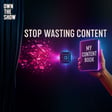
Jessica Malnik's AI Toolkit for Streamlining Marketing Processes
In this episode of the AI-Driven Marketer, Dan Sanchez talks to Jessica Malnik who is the Founder of JM Content Group about her expertise on leveraging AI for administrative tasks, debate on AI's capabilities in writing, and its role as an invaluable co-pilot in the marketing process. They also explore the practicalities of using AI tools like Zapier and ChatGPT, the integration of AI into strategic work, and offer practical advice for those embarking on their AI journey. Listen to this episode if you want to learn more about how to put AI to work for yourself.
Resources Mentioned:
- Zapier: https://zapier.com
- Trello: https://trello.com
- Perplexity AI: https://www.perplexity.ai/
- Jessica Malnik's newsletter: https://newsletter.theremoteworktribe.com/
Timestamps:
00:00 AI as a 24/7 intern in marketing.
06:05 AI vs. human expertise in content creation.
08:32 AI can generate content for niche markets.
11:03 For core niches, use subject matter experts.
16:43 ChatGPT simplifies research process, summarizes top articles.
17:24 AI reads and interprets intent based on keywords.
20:59 AI supports admin tasks, aids research and notifications.
25:53 AI, multistep processes, collaboration, industry, overestimation
27:11 Custom GPT drastically cuts down processing time.
33:08 Consider adopting AI, start experimenting, automate tasks.
36:44 Advancement and growth are essential for success.
38:17 Best to find me on LinkedIn. Also Twitter and newsletter.



![What’s Your Authority Score? [The 5-Factor Test] image](https://media.zencastr.com/cdn-cgi/image/width=112,quality=85/image-files/630c9f06819f8b3dba5fa460/cfbaccba-f587-45de-a41f-e2c99c15e2a5.png)
![The Audience Growth Engine [Full Framework] image](https://media.zencastr.com/cdn-cgi/image/width=112,quality=85/image-files/630c9f06819f8b3dba5fa460/46b84fd1-e856-4687-9aee-6b4a7e0bc7ff.png)



![The "Dream 100" Execution Plan [Google Sheet System] image](https://media.zencastr.com/cdn-cgi/image/width=112,quality=85/image-files/630c9f06819f8b3dba5fa460/fcd89374-76a4-4e58-a2e3-2bb7ddda4364.png)










